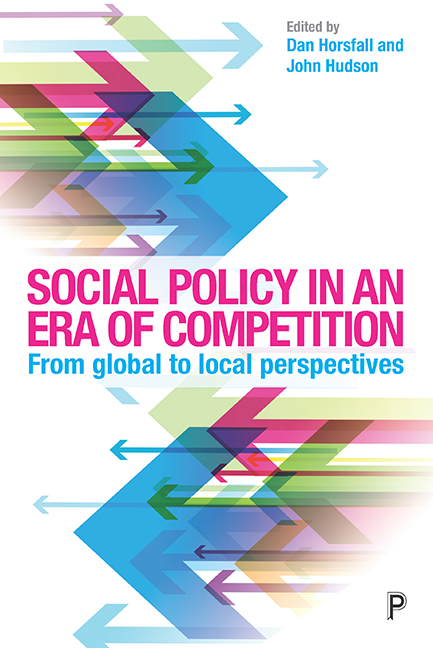Book contents
- Frontmatter
- Contents
- List of figures, tables and boxes
- List of contributors
- List of abbreviations
- Introduction: social policy in an era of competition
- Part One Global competition as the context for welfare
- Part Two The impact of intensifed competition on local governance
- Part Three The reframing of welfare discourses in an era of competition
- Part Four Conclusions
- References
- Index
four - Housing and mortgage markets in the everyday: how globalisation came home
Published online by Cambridge University Press: 05 April 2022
- Frontmatter
- Contents
- List of figures, tables and boxes
- List of contributors
- List of abbreviations
- Introduction: social policy in an era of competition
- Part One Global competition as the context for welfare
- Part Two The impact of intensifed competition on local governance
- Part Three The reframing of welfare discourses in an era of competition
- Part Four Conclusions
- References
- Index
Summary
One of the most persistent lacunae in the comparative and international welfare state literature has been the almost complete absence, over many decades, of housing. In the wave of studies that emerged in the 1990s and beyond housing continued to be at best a marginal analytical variable. Heidenheimer et al (1990), Pierson (1994, 2001), Castles (1998) and Swank (2002), for example, all down-played the role of housing in their otherwise path-breaking accounts of welfare state change. Esping-Andersen famously excluded housing from his seminal ‘Three Worlds’ study (1990). This situation is changing rapidly. One reason for this is that it has become widely acknowledged that housing and its associated mortgage markets in the US were complicit in triggering the banking crisis following the collapse of Lehman Brothers in 2007 (see, for example, Muellbauer and Murphy, 2008). Before the 1990s, however, the research field exploring the connection between housing and welfare states was limited to a very few scholars, most notably the pioneering work of Kemeny (1981).
Using ‘finance’ as the analytical lens changes the focus towards what has become known as the ‘everyday’, the micro-level sphere of individual households. Part of this approach leads to a partial abandonment of the universalistic assumptions implicit in the varieties of capitalism ideas built around corporations, ‘productivism’ and the industrial firm. It draws from the emerging recognition in the disciplines of the way in which finance capital has become an increasingly autonomous realm separated from the industrial economy (André and De Wilde, 2016).
This is a key reason for the absence of housing in comparative welfare state research, because its realm is embedded in finance capital. Wilensky openly made the point in his 1975 landmark comparative study that housing was too complicated to include because of ‘the bewildering array of fiscal, monetary and other policies that affect housing directly’ (Wilensky, 1975, p 7). Complexity is no excuse. In particular the creation of global markets through Mortgage Backed Securities (MBS) has had enormous ramifications for housing's connection to a new nexus of institutions that have played out in the financialisation of the ‘everyday’.
- Type
- Chapter
- Information
- Social Policy in an Era of CompetitionFrom Global to Local Perspectives, pp. 69 - 82Publisher: Bristol University PressPrint publication year: 2017

